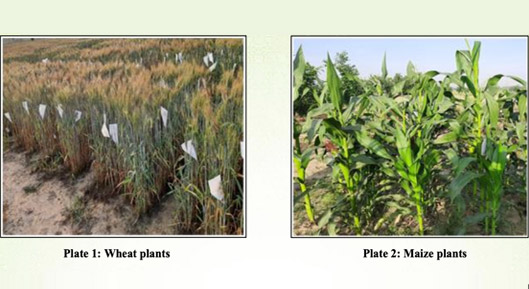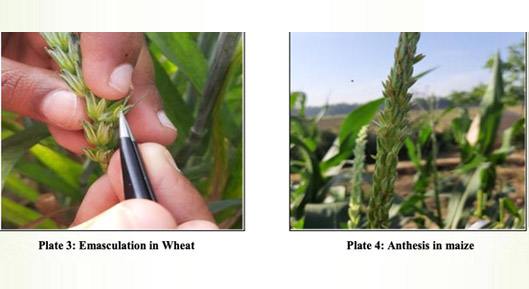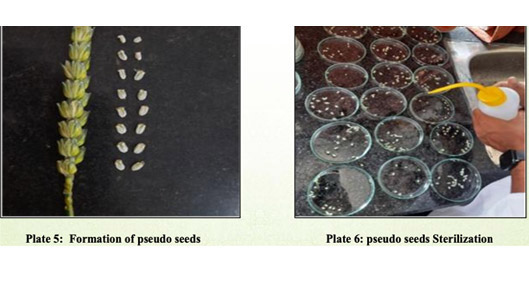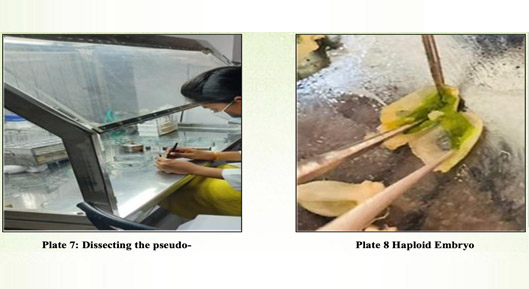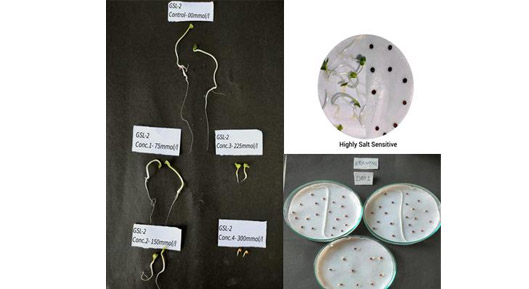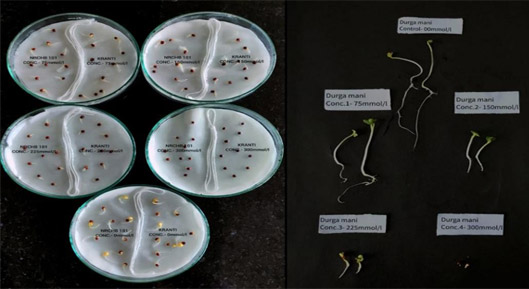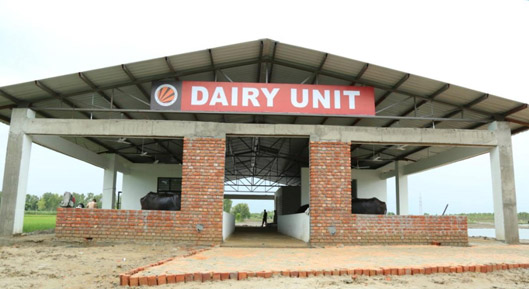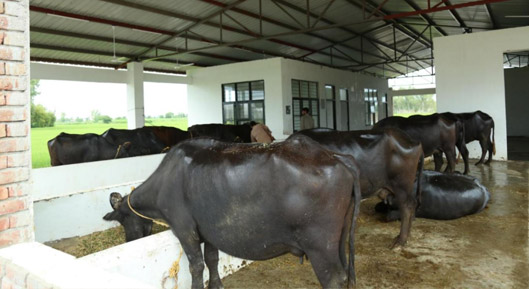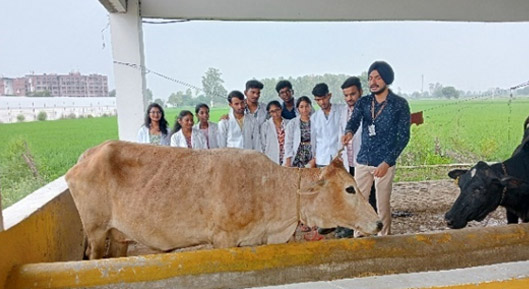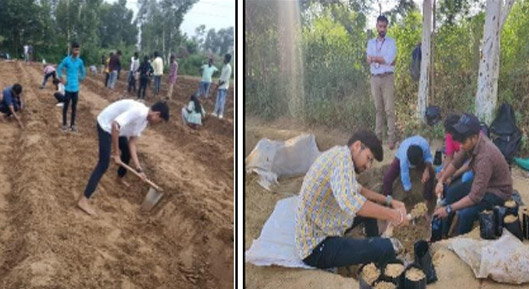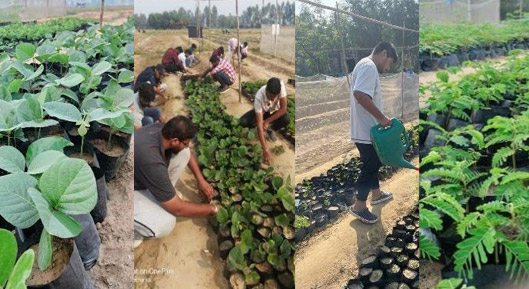Crop Museum: A Crop Museum, spanning an area of 7.5 acres, has been developed to provide practical knowledge and raise awareness about plant morphology, phenology, and the flowering and fruiting behaviors of various crops.
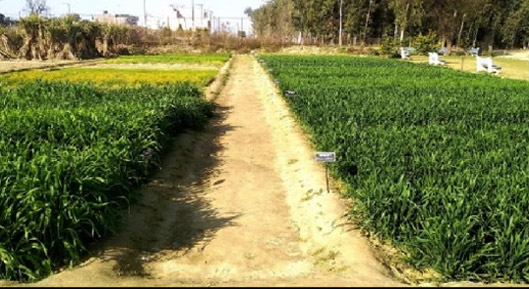
- It offers insights into weed and insect infestations, as well as disease incidences affecting plants.
- It functions as a demonstration block for showcasing advanced farming technologies to farmers.
The museum features seasonal crops, as outlined in the following table, to further enhance the learning experience for visitors
| Field Crops | Horticultural Crops | ||
|---|---|---|---|
| Summer crops | Rabi crops | Zaid/Kharif Crop | Rabi crops |
| 1. Rice –late maturing variety | 1. Wheat-Normal sown | 1. Sponge gourd | 1. Onion |
| 2. Basmati rice- Normal duration variety | 2. Wheat – late sown | 2. Cucumber | 2. Garlic |
| 3. Basmati rice – late maturing variety | 3. Black wheat | 3. Watermelon | 3. Cauliflower (Purple) |
| 4. Direct Seeded Rice (DSR) | 4. Blue Wheat | 4. Bitter gourd | 4. Cauliflower (Orange) |
| 5. Direct Basmati Seeded Rice (DBSR) | 5. Sugarbeet | 5. Bottle gourd | 5. Cauliflower (White) |
| 6. Bajra | 6. Durum wheat | 6. Musk melon | 6. Cabbage (Red) |
| 7. Fooder Maize | 7. Triticale wheat | 7. Brinjal (long green) | 7. Cabbage (Green) |
| 8. Maize- flat sowing | 8. Barley- two row | 8. Brinjal (long purple) | 8. Broccoli |
| 9. Maize- ridge sowing | 9. Barley- Six rowed | 9. Brinjal (round purple) | 9. Carrot (purple) |
| 10. American cotton | 10. Oat | 10. Brinjal (white) | 10. Carrot (yellow) |
| 11. Desi cotton | 11. Gram- Desi | 11. Chilli | 11. Carrot (red) |
| 12. Moong | 12. Gram- Kabuli | 12. Okra (Green) | 12. Radish |
| 13. Mash | 13. Lentil | 13. Okra (Red) | 13. Chinese Cabbage |
| 14. Arhar | 14. Raya | 14. Ridge gourd | 14. Pakchoi |
| 15. Soyabean | 15. Toria | 15. Kakri | 15. Turnip |
| 16. Rice bean | 16. Gobhisarson | 16. Dolichos bean | 16. Beet root |
| 17. Ground nut | 17. Gobhisarson- canola | 17. Tinda | 17. Spinach |
| 18. Seasame/ Til | 18. Linseed | 18. Pumpkin | 18. Malabar Spinach (Green) |
| 19. Guar | 19. Safflower | 19. Ash gourd | 19. Malabar Spinach (Red) |
| 20. Sorghum | 20. Celery | 20. Snake gourd | 20. Palak |
| 21. Dhaincha | 21. Coriander | 21. Tomato (indeterminate) | 21. Lettuce (Green) |
| 22. Guinea grass | 22. Fennel | 22. Tomato (determinate) | 22. Lettuce (Red) |
| 23. Cow pea | 23. Dil seed (Soye) | 23. Cluster bean | 23. Coriander |
| 24. Lemon grass | 24. Fenugreek | 24. Long melon (tar) | 24. Kasuri Methi |
| 25. Tulsi | 25. Honey plant | 25. Cowpea | 25. Potato |
| 26. Turmeric | 26. Berseem | |
26. Sweet Potato |
| |
Spring crops | |
27. Colocasia (Bunda type) |
| |
1. Sunflower | |
28. Colocasia (Arvi type) |
| |
2. Sethi Moong | |
29. Sweet Pepper |
| |
3. Sethi Mash | |
30. Shallot |
| |
4. Sugarcane | |
31. Leek |
| |
|
|
32. Knol Khol |
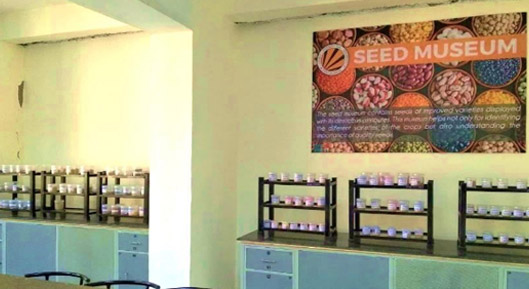
Seed Museum
The Seed Museum showcases seeds from improved varieties, highlighting their desirable attributes, and aligns with UN SDG 2: Zero Hunger and SDG 15: Life on Land. This museum serves as a valuable resource for identifying various crop varieties while also emphasizing the significance of quality seeds in promote agriculture. Seed museum approximately 100 gm of seeds of released varieties each in twenty-five crops namely cereals, millets, pulses, oilseeds and fiber crops have been collected and displayed in seed museum.The crop wise details given in table as follows
| Cereals & Millets | Pulses | Oilseeds | Fibre Crops | Vegetables |
|---|---|---|---|---|
| Rice | Green gram | Groundnut | Cotton | Brinjal |
| Wheat | Black gram | Soybean | Jute | Cucumber |
| Maize | Red gram | Rapeseed and mustard | Mesta | Okra |
| Sorghum | Chickpea | Sunflower | Bottle Gourd | |
| Pearl millet | Kidney bean | Safflower | Chillies | |
| Finger millet | Lentil | Sesamum | Tomato | |
| Foxtail millet | Garden pea | Linseed | ||
| Triticale | ||||
| Rye |
Plant Breeding Process
- Implementing Marker-Assisted Selection (MAS) techniques to accelerate the breeding process and enhance the efficiency of selecting desirable traits.
- Developing new crop varieties with improved qualities and agronomic performance through distant hybridization, thereby expanding the genetic diversity of cultivated crops.
- Conducting multi-location trials to evaluate germplasm, studying genotype-by-environment interactions to identify stable and widely adaptable genotypes.
Nursery Unit
Launched in 2022, the module aims to develop and nurture skills in the production of quality planting material for forest species. Approximately 60 students participated in identifying and collecting superior planting material for commercial forest tree species. Through the propagation of various species, including Karanj, Drumstick, Palash, Mahaneem, and Tamarind, the students successfully developed and sold around 2,500 seedlingsLPU has more than 5300 sq. ft. area designated for nursery of ornamental plants and 12900 sq. ft. area for fruits and forestry species. The nursery area is used to raise rootstocks of fruit species for providing students hands-on grafting and budding practices in guava, mango, ber, jamun etc. The cuttings of popular, eucalyptus, grapes, mulberry, fig, pomegranates etc. have been developed by the students during practicals. The seedling of ornamental plants like ice plants, etc are developed during practical courses and ELP activities.
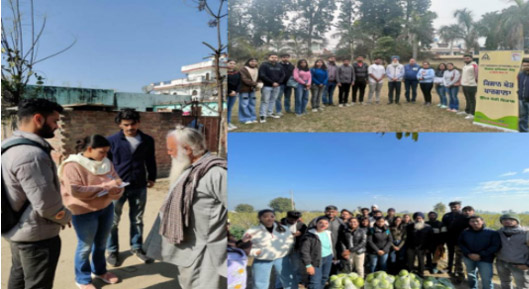
Rural Agriculture Work Experience (RAWE)
RAWE programme is aimed at providing an opportunity to the students to understand the rural setting in relation to agriculture and allied activities. It helps the students to get familiarized with the socio-economic conditions of the farmers and their problems. The students learn to develop communication skills using extension teaching methods to facilitate interaction and transfer of technology besides imparting diagnostic and remedial knowledge relevant to the real-life situations. The Programme is carried out through following stages:The students are given one-week in-house training to sensitize on defining goals and objectives of village attachment. The mode, means and methodology for interaction with farmers and the documentation procedure is clearly explained. These sessions serve the purpose of clearly illustrating the expectations during RAWE.
An individual student interacts with minimum five farmers of different land-holdings where one gathers information through a format relating to livelihood, farming system, cropping pattern, land use pattern, soil nutrient status, livestock information, mechanization, income generation and major challenges faced during agricultural practices.
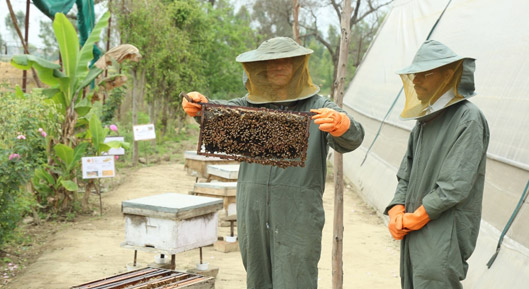
Bee Keeping Unit
The School has established a Commercial Bee-keeping unit for students training and practical. Apart from honey production, the bees also play a vital role in pollination of numerous fruits and vegetables thus contributing towards enhancement of yield. The students of B.Sc.(Hons.) Agriculture gets hands-on various aspects of honeybee management i.e. establishment of honeybee colonies, beehive management, honey collection and extraction, processing and marketing of honey.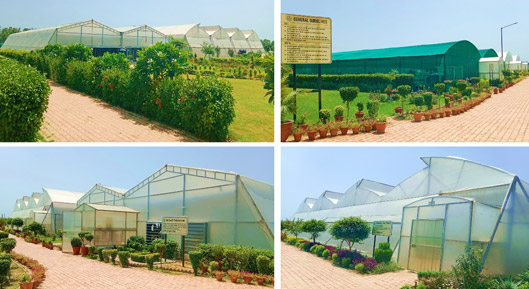
Poly House/ Green House
The School has created infrastructure in the form of Hi-Tech Poly House, Naturally Ventilated Poly House, Poly Tunnels and Shade Net House which is utilized for conduct of practical’s, Hands-on-Training, Experiential Learning, project work, dissertation work, and commercial crop production.Hi-Tech Poly House with an area of 6027 sq. ft., equipped with fan pad system for cooling and thermoregulation, and misting facility for maintaining humidity inside chamber. This structure is used to grow the seedlings of various vegetable like brinjal, chillies, capsicum, cauliflower, cabbage, etc. and ornamental plants like chrysanthemum
In addition to this, a pair of Polytunnels with dimension of more than 10000 sq. ft. is used for conducting dissertation, project and Hands-on-Training activities by the students. It is used to grow cucumber, capsicum, strawberry, chillies, brinjal etc.
Saw Tooth Naturally Ventilated Poly House of an area of 10850 sq. ft. is available for providing training on commercial horticulture crops production and cultivation of ornamental plants. The commercial cultivation of tomatoes, cherry tomato, brinjal, capsicum, gerbera, carnation is carried out in this structure.
Shade Net House of an area of 5425 sq. ft. is available for providing practical skill, Hands-on-Training practices on ornamental plants. It is also used to grow lilium and develop nursery of many fruit plants like cuttings of grapes, pomegranate etc.
Germination Chamber with area of 2690 sq. ft. is available to provide controlled environment for inducing germination in seeds. This is helpful to induce germination during un-favourable conditions i.e., excessive heat and cold.
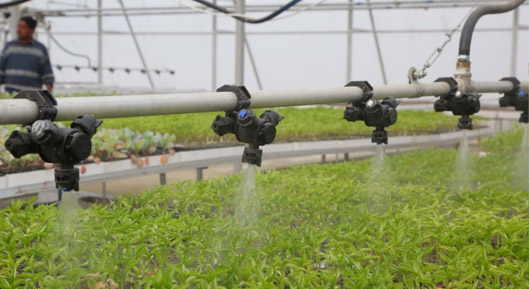
Instructional Farm for Sustainable Farming Practices
The School has 350 acres of land comprising instructional farms including Polyhouses, Shed Net House, and Germination Chamber etc. Instructional farm land is further demarcated into 104 acres for conduct of practicals and Hands-on Training of students of B.Sc. (Hons.) Agriculture and remaining 96 acres are meant for research work of postgraduate students.The farm area is provided as per the requirement of respective disciplines for developing skills of students in agro-techniques such as land preparation, plant protection measures, sowing methods, harvesting, grading-packing methods etc. along with providing facilities for experiential learning, hands-on-training and facilitating dissertation work of the students and other research activities
The Instructional Farm at LPU also serves as a hub for research and innovation in agriculture. Students and faculty engage in projects aimed at developing new farming techniques, improving crop varieties, and exploring sustainable agricultural practices. Collaborations with industry partners and research institutions further enhance the farm's role in agricultural advancement.
The farm plays a significant role in community outreach, actively engaging with local farmers and agricultural stakeholders. By offering training sessions, informational seminars, and collaborative projects, the Instructional Farm helps improve agricultural practices in the region. This outreach fosters a strong connection between the university and the local community, promoting knowledge exchange and supporting local food systems.
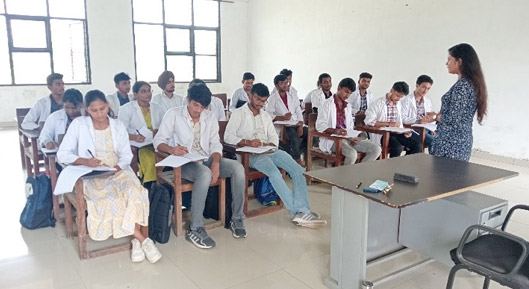
Classrooms at farm
Four classrooms of size range 864 sq. ft. each with whiteboard and other facilities has been developed for providing practical demonstration and discussion at the farm itself (Picture 1.7(a)). This is used for discussion during conduct of farm-based practical in courses like Practical Crop Production, Seed Production Technology, Nursery Management, Floriculture and Landscaping and other ELP based courses.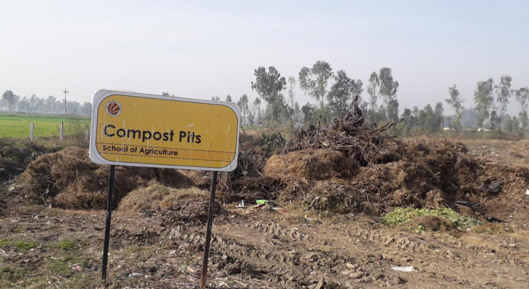
Agro Waste Compost Pits at School of Agriculture
Agro waste plays a vital role in achieving SDG 15 by promoting sustainable land use and ecosystem conservation. When repurposed as compost or bioenergy, it enhances soil health, reduces land degradation, and helps prevent deforestation by offering alternatives to wood-based resources. Proper management of agro waste supports biodiversity and fosters a circular economy, contributing to the restoration and preservation of terrestrial ecosystems.Dairy Unit at LPU
A dairy unit with area of 5300 sq. ft. with capacity to cater 20 cattle has been constructed for conduct of practical and Hands-on-Training activities on live-stock production.Experiential Learning Programme (ELPs)
Experiential Learning/Hands on Training: Scope of the Experiential Learning Programme includes ‘Hands-on-Training’ and ‘Learning by Doing’. The programme primarily emphasizes on understanding and perform hands-on in technologically advanced methodologies for production of agricultural crops, fruits, vegetables, ornamental, medicinal, aromatic, forest plants etc. It also engages students in integrated farming systems consisting of production of honey, mushrooms, vegetables, fruits, livestock for milk and processing for value added products etc.The university has sanctioned 30 ELP modules including the modules mentioned in students' READY programme of V Deans' Committee. The ELP modules have been drafted to supplement the current market and societal needs which includes futuristic areas like chemical free agriculture, remote sensing, IoT application and machine learning, robotics, soilless cultivation, micro-irrigation, food processing etc. These are designed and delivered to ensure the development of entrepreneurial skills and life-long learning among graduating students. These modules are instituted to provide Hands-on training and skill development training to the students of the programme.
In the beginning following modules were established for Experiential Learning Programme (ELP) such as Commercial beekeeping, Mushroom cultivation technology, Agriculture waste management, Organic production technology, Food processing, Seed production and technology, Commercial horticulture, Floriculture and landscape architecture, Production technology for bioagents and biofertilizer and Soil, plant, water and seed testing.
Various new modules like ITK for Sustainable Agriculture, Composting by Different Methods, Traditional and Value-Added Dairy Products, Commercial Vegetable Production, Design and Development of Machines, Production Technology for Biopesticides and Biofertilizers, Hydroponics Systems for Growing Plants etc. have been introduced in the programme to increase the scope and span of training of the students. The aim to introduce these modules is to increase the overall hands-on experience in recent industry-oriented skills.
The School has facilitated Experiential Learning/Hands-on-Training of the students under the following modules:
| S. No. | Module |
|---|---|
| 1 | Mushroom Cultivation Technology |
| 2 | Hydroponics Systems for Growing Plants |
| 3 | Production of Quality Planting Material of Forest Species |
| 4 | Production of Ornamental Plants and Nursery Aspects |
| 5 | Protected Cultivation of Flower Crops |
| 6 | Commercial Flower Production and Landscape Gardening |
| 7 | Protected Cultivation of Vegetable Crops |
| 8 | Commercial Vegetable Production |
| 9 | Nursery Production and Management of Fruit Plants |
| 10 | Quality Seed Production of Field Crops |
| 11 | Commercial Beekeeping |
| 12 | Composting by Different Methods |
| 13 | Crop Production-Millets |
| 14 | Organic Farming |
| 15 | ITK for Sustainable Agriculture |
| 16 | Lac Cultivation |
| 17 | Mass Multiplication of Bioagents |
| 18 | Robotics and Automation for Agriculture |
| 19 | Remote Sensing and IoT in Agriculture |
| 20 | Soil, Plant, Water and Seed Testing |
| 21 | Production Technology for Biopesticides and Biofertilizers |
| 22 | Production Technology for Mycorrhiza |
| 23 | Production Technology for Yeast |
| 24 | Water and Fertigation Management in Microirrigation |
| 25 | Design and Development of Machines |
| 26 | Agricultural Machinery Management |
| 27 | Post Harvest Technology and Value Addition |
| 28 | Dehydrated Fruits and Vegetables Processing |
| 29 | Cereal and Bakery Technology |
| 30 | Vermicompost-Production and Practices |
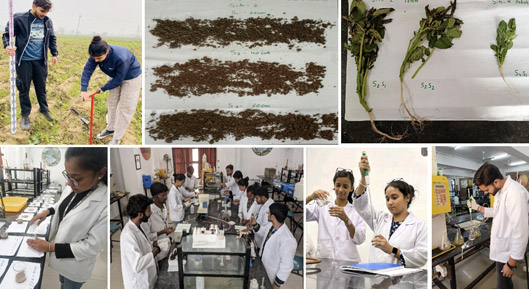
Soil, Plant, Water and seed testing
This module was established in 2018 with the aim to develop skill and awareness of soil physical and chemical properties and its practical application to resolve soil fertility and productivity related problems of the farmers. Students are provided with hands-on training for evaluation of fertility status of soil; available nutrients of the soil; estimation of fertilizer requirement for the soil (Picture 1.30). They are also trained to analyse the plant nutrient status and irrigation water qualities. So far more than 260 students have been trained.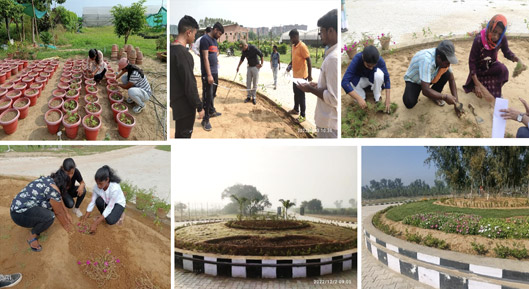
Commercial Flower Production and Landscaping Gardening
This unit was established in year 2018 as Floriculture and Landscape Architecture to infuse entrepreneurial skills of commercial cultivation of flowers for year around production of flower through hands-on training. Students have produced ornamental plants such as Marigold, Zinnia and Gaillardia designed and installed different landscape plan such as Water-garden, Rock garden, Vertical garden and Golf garden in the agriculture farm area. More than 300 students were trained in commercial flower production and landscaping gardeningProduction of Quality Planting Material of Forest Species
The module started in 2022 to develop and nurture skills in production of quality planting material of forest species (Picture 1.27). Around 60 students were involved for identification and collection of superior planting material for commercial forest tree species. The students have developed and sold around 2500 seedlings through propagation of different species such as Karanj, Drumstick, Palash, Mahaneem, Tamarind etc.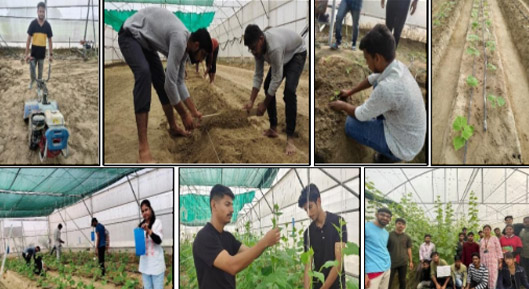
Protected Cultivation of Vegetable Crops
This module was established in 2022 with the aim to provide entrepreneurial skills in protected cultivation of off season and high value vegetable crops like Parthenocarpy cucumber, cherry tomato, French bean, muskmelon, coloured capsicum, etc. The students were engaged in planning, maintenance and management of selected crops. The students are engaged in activities such as varietal selection, sowing, fertilization, irrigation, weeding and other cultural practices to ensure higher and economical yields of quality produce. Till now more than 60 students have been trained in this module.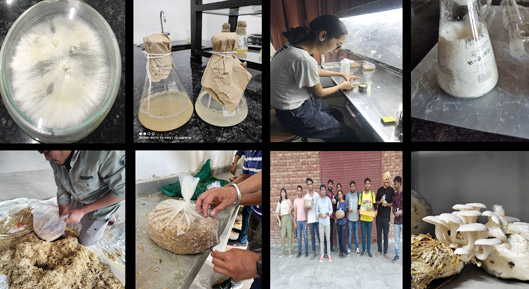
Mushroom Production Technology
The mushroom cultivation technology unit was established in 2016 with the aim to provide the skills on mushroom cultivation for initiation entrepreneurial venture (Picture 1.10). More than 300 students have been trained from 2016 till date and among them one has already started his own business. The students are trained on media preparation, sterilization process, mushroom culture for spawn production, pests and diseases management, harvesting techniques, post-harvest handling techniques and marketing of mushrooms.


